|
|
|
Sort Order |
|
|
|
Items / Page
|
|
|
|
|
|
|
| Srl | Item |
| 1 |
ID:
095185
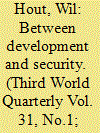

|
|
|
|
|
| Publication |
2010.
|
| Summary/Abstract |
This article focuses on the recent attention in the European Union on fragile states, as expressed, among others, in the European Security Strategy of 2003 and the European Consensus on Development of 2006. Most understandings of the notion of state fragility concern limited state capacity, the inability of institutions to deal with social and political tensions or problems of state legitimacy. The EU is no exception to this general trend of seeing state fragility in terms of governance deficits. Its approach to preventing and responding to state fragility, which was adopted by the European Council in 2007, is being tested in six pilot countries. The article analyses the governance-oriented measures that have been adopted in the Country Strategy Papers (CSPs) agreed between the European Commission and five of the six pilot countries, concluding that there is a profound gap between the political-economic analyses of the CSPs and the support policies implemented by the EU. The approach of the European Commission revolves around attempts to reconstruct state capacities in fragile states through technocratic measures. Fundamental problems of state capture, ethnic relations, human rights violations and extreme inequalities are beyond the purview of policy makers in the European Union.
|
|
|
|
|
|
|
|
|
|
|
|
|
|
|
|
| 2 |
ID:
105951
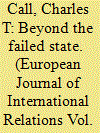

|
|
|
|
|
| Publication |
2011.
|
| Summary/Abstract |
The article advances conceptual alternatives to the 'failed state.' It provides reasons why the concept is deficient, showing especially how counterproductive it is to aggregate states as diverse as Colombia, Malawi, Somalia, Iraq, Haiti, and Tajikistan. I argue for distinguishing among capacity gaps, security gaps, and legitimacy gaps that states experience. Importantly, I show that these gaps often do not coincide in a given country, and that the logical responses to each of the three gaps diverge in significant ways. I offer brief case examples of the logic of response to the gaps and of the tensions that must be managed among them. The article advances the debate over an important and under-theorized emergent concept in global politics.
|
|
|
|
|
|
|
|
|
|
|
|
|
|
|
|
| 3 |
ID:
151495
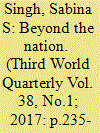

|
|
|
|
|
| Summary/Abstract |
Global frameworks for democratic development today tend to remain within a comparative lens where each country is treated as a sovereign capsule. This portrait eludes the political structures that accompany contemporary globalisation and set the conditions for domestic development. Notably, the comparative perspective eschews the hierarchical nature of states and influential non-state actors that impact democracy movements. Merging international relations theory and comparative politics and using the example of Uganda to illustrate, I create ‘the politics of dispensation.’ Like a doctor dispensing a pill to a patient, Uganda shows how susceptible a country can be to forces beyond democratic control.
|
|
|
|
|
|
|
|
|
|
|
|
|
|
|
|
| 4 |
ID:
145569
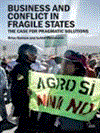

|
|
|
|
|
| Publication |
London, Routledge, 2016.
|
| Description |
230p.pbk
|
| Series |
Adelphi Paper no. 457-458
|
| Standard Number |
9781138213975
|
|
|
|
|
|
|
|
|
|
|
|
Copies: C:1/I:0,R:0,Q:0
Circulation
| Accession# | Call# | Current Location | Status | Policy | Location |
| 058695 | 363.32/GAN 058695 | Main | On Shelf | General | |
|
|
|
|
| 5 |
ID:
140329
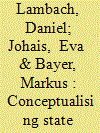

|
|
|
|
|
| Summary/Abstract |
This paper proposes a theoretically grounded and methodologically rigorous conceptualisation of state collapse. It seeks to overcome several key deficits of research into fragile, failed and collapsed states, which is often criticised as normatively problematic and methodologically deficient. We argue that this is a worthwhile topic to study but that scholarly inquiry needs to become more systematic and focus on extreme cases of state collapse. Following a Weberian institutionalist tradition, we disaggregate statehood into three dimensions of state capacity: making and enforcing binding rules, monopolising the means of violence and collecting taxes. We then propose a set of indicators as well as a mode of aggregation based on necessary and sufficient conditions. Our framework identifies 17 cases of state collapse in the postcolonial era.
|
|
|
|
|
|
|
|
|
|
|
|
|
|
|
|
| 6 |
ID:
108736
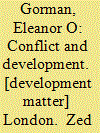

|
|
|
|
|
| Publication |
London, Zed Books, 2011.
|
| Description |
x, 179p.Pbk
|
| Standard Number |
9781848135758
|
|
|
|
|
|
|
|
|
|
|
|
Copies: C:1/I:0,R:0,Q:0
Circulation
| Accession# | Call# | Current Location | Status | Policy | Location |
| 056374 | 909.82/GOR 056374 | Main | On Shelf | General | |
|
|
|
|
| 7 |
ID:
145760
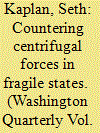

|
|
|
|
|
| Summary/Abstract |
International efforts to build strong states in places which lack them have repeatedly failed.1 Although some have taken failures in places such as Afghanistan, Iraq, and Somalia as reason for retrenchment, the violent movements that have sprung from the porous borders of the fragile world have illustrated that ignoring fragile states comes with a tremendous cost.
|
|
|
|
|
|
|
|
|
|
|
|
|
|
|
|
| 8 |
ID:
161350
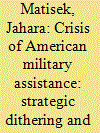

|
|
|
|
|
| Summary/Abstract |
The United States has provided substantial amounts of military assistance and aid since the end of World War Two. During the Cold War, it proved vital in protecting numerous regimes from communist takeovers. Successful outcomes occurred when American leaders made large initial aid commitments, and the states had the capacity and political willpower to use it effectively. However, Vietnam was an example of how U.S. support lagged, as leaders in Saigon preferred political survival instead of creating regime legitimacy. Following 9/11, American security aid focused on making weak countries develop stronger security forces. Unfortunately, this created Fabergé egg militaries: expensive and easily broken by insurgents. This article suggests long-term strategic commitments need to be made alongside more resources for the American State Department and similar organizations to focus on the politics of state-building. Finally, this article suggests strategies, such as “whole-of-government” approaches, to improve long-term security and political institution building.
|
|
|
|
|
|
|
|
|
|
|
|
|
|
|
|
| 9 |
ID:
180312
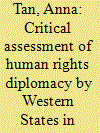

|
|
|
|
|
| Summary/Abstract |
Myanmar (Burma) from 2007 to 2020 observed a short-lived détente with major Western governments after decades of ostracism. Armed conflict and mass atrocities worsened despite significant democratisation. The article outlines Myanmar's short-lived democratic rule from beginning to end, before its coup d'etat in early 2021 and acceleration to state failure by the time of writing. This article assesses the strengths and limitations of Western human rights diplomacy vis-à-vis Myanmar during this 14-year frame, using in-depth interviews with former/working diplomats and experts as primary sources, in addition to secondary sources. Ostracism dominated Western bilateralism pre-2011, followed by the principled engagement of Australia, Norway and the UNSG's good offices, the latter based on Articles 98 and 99 of the UN Charter. Myanmar's military democratised with the aim of counterbalancing overdependence on China and seeking legitimacy as reformers. A reverse trend was observed after the 2016 Rohingya crisis. It demonstrates the dangers of neglecting the law of diminishing returns through advocacy, and of conflating domestic democracy and human rights advocates as principled practitioners. It concludes that it is in the pragmatic interests of Western governments to coordinate and institutionalise human rights principles in longer-term foreign policymaking, and that democratisation before peacebuilding increases state fragility.
|
|
|
|
|
|
|
|
|
|
|
|
|
|
|
|
| 10 |
ID:
130928
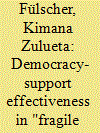

|
|
|
|
|
| Publication |
2014.
|
| Summary/Abstract |
Processes of political transformation and external assistance in fragile states have received increasing attention in the academic literature over the past decade. This literature, however, has not yet adopted a multi-dimensional categorization of fragility. This article discusses the evolution of the concept of fragility, and assesses the growing literature on processes of political transformation in fragile states, with a special focus on the quantitative literature and on the effectiveness of external democracy-support policies. Its novelty lies in its contribution to drawing links between these parallel bodies of literature. Furthermore, this article argues that, by incorporating a more complex definition of fragility, future research could reach more nuanced approaches on how fragility influences both processes of democratization and the effectiveness of democracy-support policies.
|
|
|
|
|
|
|
|
|
|
|
|
|
|
|
|
| 11 |
ID:
132895
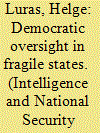

|
|
|
|
|
| Publication |
2014.
|
| Summary/Abstract |
In most transition countries the main aim of 'democratizing intelligence' is to weaken the authoritarian governmental structures by introducing more transparency, legality and oversight. In Bosnia and Herzegovina however, the state-building efforts driven by international parties combined formal democratization processes such as independent oversight with the strengthening and operational capacity building of previously weak-to-non-existent intelligence structures. In parallel with the descent into war when Yugoslavia collapsed in the early 1990s, the State Security Service (SDB) in the Republic of Bosnia had split into three ethnically-based outfits answering to the political and military leaders of war. 'Democratization' of intelligence in Bosnia and Herzegovina since the establishment of a unified, state-level Intelligence and Security Agency (OSA) in 2004 has followed its own unique path reflecting the fragmented nature of politics in Bosnia and the leading role of international organizations in proposing and effectuating institutional reforms. Nevertheless, in terms of habits, operational methods and values many Bosnian intelligence officers went through similar adaptations and transitions as their colleagues in countries where institutions at the time of democratic transition were too strong and authoritarian rather than, as in the case of Bosnia, being deemed too weak and ineffectual.
|
|
|
|
|
|
|
|
|
|
|
|
|
|
|
|
| 12 |
ID:
140328
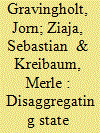

|
|
|
|
|
| Summary/Abstract |
This conceptual and methodological article makes the case for a multidimensional empirical typology of state fragility. It presents a framework that defines fragile statehood as deficiencies in one or more of the core functions of the state: authority, capacity and legitimacy. Unlike available indices of state fragility, it suggests a route towards operationalisation that maintains this multidimensionality. The methodology presented should help in future research to identify clusters of countries that exhibit similar constellations of statehood, whereby ‘constellation’ refers to the specific mix of characteristics across the three dimensions. Such an identification of empirical types would fulfil a demand that exists both in academic research and among policy circles for finding a more realistic model of fragility at an intermediate level between single-case analyses and the far-too-broad category of state fragility.
|
|
|
|
|
|
|
|
|
|
|
|
|
|
|
|
| 13 |
ID:
188998
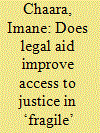

|
|
|
|
|
| Summary/Abstract |
Access to justice is often described as key for building and consolidating peace and enhancing socio-economic development in fragile and post-conflict states. Since the 2000s, legal empowerment has been one of the most popular approaches to improve such access, and a growing literature has presented mixed evidence on the quality of its outcomes. We evaluate and discuss the impact of a locally provisioned legal aid program on justice-seekers’ use of dispute resolution fora, legal agency, and trust in judicial institutions. The program was implemented between 2011 and 2014 in 26 municipalities of rural Burundi. We consider its effects on 486 beneficiaries using various propensity score-matching methods and data on non-beneficiaries from two distinct control groups (n = 3,267). Forty-eight interviews with key informants help discuss judicial practices. We find that the program increased the use of courts but not trust in the judiciary. It had no significant impact on the use of alternative dispute resolution mechanisms. Qualitative and quantitative evidence suggests that justice-seekers’ perception of the treatment they received in courts, also known as procedural justice, shaped their perception of accessing justice. Qualitative evidence also points to a possible ‘watchdog effect’: in some cases, the presence of a legal adviser may have pushed judges to better comply with procedures. While legal aid programs can improve access to courts, it does not necessarily mean an erosion of judicial ‘forum shopping’ or that trust in state institutions is reinforced and rights fully realized.
|
|
|
|
|
|
|
|
|
|
|
|
|
|
|
|
| 14 |
ID:
162249
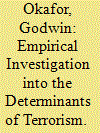

|
|
|
|
|
| Summary/Abstract |
This study investigates the determinants of terrorism in countries that are in the top category of the Fragile States Index (FSI), and are also prone to terrorism. Panel data for 38 countries mainly from Sub-Saharan Africa, the Middle East and North Africa, and South Asia for the years 2005–2014 are used. Findings from the negative binomial and fixed effects estimation show that fragile state, number of refugees and youth unemployment have positive and significant impacts on terrorism. Military spending is positive but less robust across models. Conversely, FDI and remittances have a negative impact on terrorism with the former less robust. Governance and foreign aid are negative and insignificantly related to terrorism. Policy implications follow from the findings.
|
|
|
|
|
|
|
|
|
|
|
|
|
|
|
|
| 15 |
ID:
102167


|
|
|
| 16 |
ID:
088675
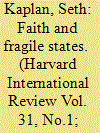

|
|
|
| 17 |
ID:
133631
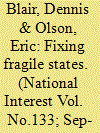

|
|
|
|
|
| Publication |
2014.
|
| Summary/Abstract |
America's cumbersome approach to interagency operations in the field urgently needs reform, centered around more powerful ambassadors and coordinated in-country policy design.
SINCE THE 9/11 attacks, the United States has waged major postwar reconstruction campaigns in Iraq and Afghanistan and similar but smaller programs in other countries that harbor Al Qaeda affiliates. Continued complex political, economic and military operations will be needed for many years to deal with the continuing threat from Al Qaeda and its associated organizations, much of it stemming from fragile states with weak institutions, high rates of poverty and deep ethnic, religious or tribal divisions. Despite thirteen years of experience-and innumerable opportunities to learn lessons from both successes and mistakes-there have been few significant changes in our cumbersome, inefficient and ineffective approach to interagency operations in the field.
|
|
|
|
|
|
|
|
|
|
|
|
|
|
|
|
| 18 |
ID:
141891
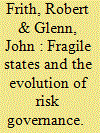

|
|
|
|
|
| Summary/Abstract |
Following the plane crashes into the twin towers of the World Trade Centre, Ulrich Beck claimed that the West would need to pursue ‘border-transcending new beginnings’ towards a more cosmopolitan world. Rather than any radical transformation along cosmopolitan lines, however, this paper maps a process of incremental reform and policy bricolage, where the post-cold war politics of intervention, and the securitisation of development, have been extended to encompass international terrorism in three overlapping phases. Although these overlapping phases – intervention, prevention and extension – are reflexive moments, they constitute a strengthening of the prevailing rationalities and technologies of risk rather than a radical rupture.
|
|
|
|
|
|
|
|
|
|
|
|
|
|
|
|
| 19 |
ID:
193077
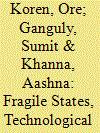

|
|
|
|
|
| Summary/Abstract |
Research on terrorism disagrees on whether terrorist activity is at its highest in collapsed states, which are more hospitable to such activities, or whether terrorism increases in more capable states. We revisit this discussion by theorizing an interactive relationship: terrorists prefer to operate in politically-hospitable states, but their attack frequency within these states increases with greater technological capacity, which allows them to expand their military, recruitment, and financing operations. We analyze 27,018 terrorist incidents using regression and causal inference models, conduct a case study, and find robust support for this interactive logic. Our conclusions outline implications for policy and academic work.
|
|
|
|
|
|
|
|
|
|
|
|
|
|
|
|
| 20 |
ID:
171931
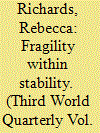

|
|
|
|
|
| Summary/Abstract |
Even in the context of a relatively flourishing state, fragility can be an enduring feature of a political system, particularly in the case of recently established or unrecognised states. This article examines the nature of state-building in a specific context to question the assumption that forms of hybrid governance or pre-existing forms of governance are a necessary evil to be tolerated but which needs ultimately to be overcome during state-building. It does this by adopting the language of resilience and focusing on the case of Somaliland to highlight the role of clan governance as a mechanism of political resilience and as a means of promoting the flexibility required for state-building. Yet, at the same time, the process of state-building often involves formalising governance and limiting the role of traditional social-political forms of governance such as clans, ignoring their role in legitimating and stabilising the political system. However, as this article argues, stability and fragility are inextricably linked; while the clan system has been an important force in stabilising the state, it has also become a pressure point for the state’s latent fragility. By contextualising fragility and stability within the language of resilience, though, this symbiotic relationship can be better analysed.
|
|
|
|
|
|
|
|
|
|
|
|
|
|
|
|
|
|
|
|
|